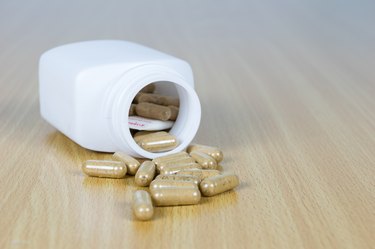
Many natural supplements can affect your blood sugar, including niacin, DHEA, ginkgo biloba, melatonin, black or green tea, glucosamine sulfate and high-dose fish oil or vitamin C. Other supplements might lower blood sugar levels and require a dosage change if you take a medication for diabetes. Check with your health care provider before you start taking any supplement so that you can be aware of how the supplement might affect your blood sugar, blood lipids, blood pressure and kidneys, as well as any potential drug interactions.
Niacin
Video of the Day
Niacin and niacinamide, or vitamin B-3, are used to lower total and "bad" LDL cholesterol and triglycerides, while increasing "good" HDL levels. According to the Natural Medicines Comprehensive Database, niacin and niacinamide can cause hyperglycemia – or high blood sugar, abnormal glucose tolerance and glycosuria – or sugar loss in the urine. If you start high dose niacin, you might need to check your blood glucose more often, and the dose of any diabetes medications might need to be adjusted.
Video of the Day
DHEA
DHEA has been taken for many conditions. According to the Natural Medicines Comprehensive Database, it might be effective in treating aging skin, erectile dysfunction, osteoporosis, schizophrenia and systemic lupus. DHEA can increase insulin resistance and raise blood sugar levels, and might also worsen fat levels. If you have diabetes, check with your doctor before taking DHEA and monitor your blood sugar level closely.
Ginkgo
Ginkgo biloba is also taken for many conditions. It might be beneficial in treating age-related memory impairment, dementia, diabetic retinopathy, glaucoma and peripheral vascular disease. According to the Natural Medicines Comprehensive Database, ginkgo seems to alter insulin secretion and metabolism. It might increase insulin breakdown by the liver, leading to lower insulin levels and increased blood sugar. If you have diabetes, check with your doctor before taking ginkgo and monitor your blood sugar level closely.
Melatonin
Melatonin is used primarily to treat sleep disorders. It might raise blood sugar levels by increasing insulin resistance and decreasing glucose uptake into cells. It can also worsen blood pressure levels. Check with your doctor before taking melatonin, especially if you have diabetes or high blood pressure.
Caffeine
Caffeine is a constituent of coffee and teas, including black, green and oolong tea, and is an ingredient in many weight loss supplements, energy supplements and energy drinks. In large amounts, caffeine might raise blood sugar by contributing to insulin resistance and decreasing post-meal glucose metabolism in people with diabetes.
Others
Fish oil is used primarily to lower triglycerides and reduce heart disease risk. In some people with type 2 diabetes, high doses of fish oil increase fasting blood sugar levels.
Glucosamine sulfate is often used to treat joint problems. It might raise blood sugar levels in people with diabetes by increasing insulin resistance or decreasing insulin production.
High-dose vitamin C intake has been linked to higher fasting blood sugar levels. Also, doses greater than 300 mg of vitamin C daily in postmenopausal women with diabetes have been associated with increased death from cardiovascular disease.
- Medline Plus: Herbs and Supplements
- Office of Dietary Supplements: Dietary Supplement Fact Sheets
- National Center for Complementary and Alternative Medicine: Herbs at a Glance
- Natural Medicines Comprehensive Database; Interactions with Diseases or Conditions
- Diabetes Health; High Doses of Vitamin C Supplement Increase Blood Glucose Levels; Daniel Trecroci; September 1, 1999
Is this an emergency? If you are experiencing serious medical symptoms, please see the National Library of Medicine’s list of signs you need emergency medical attention or call 911.